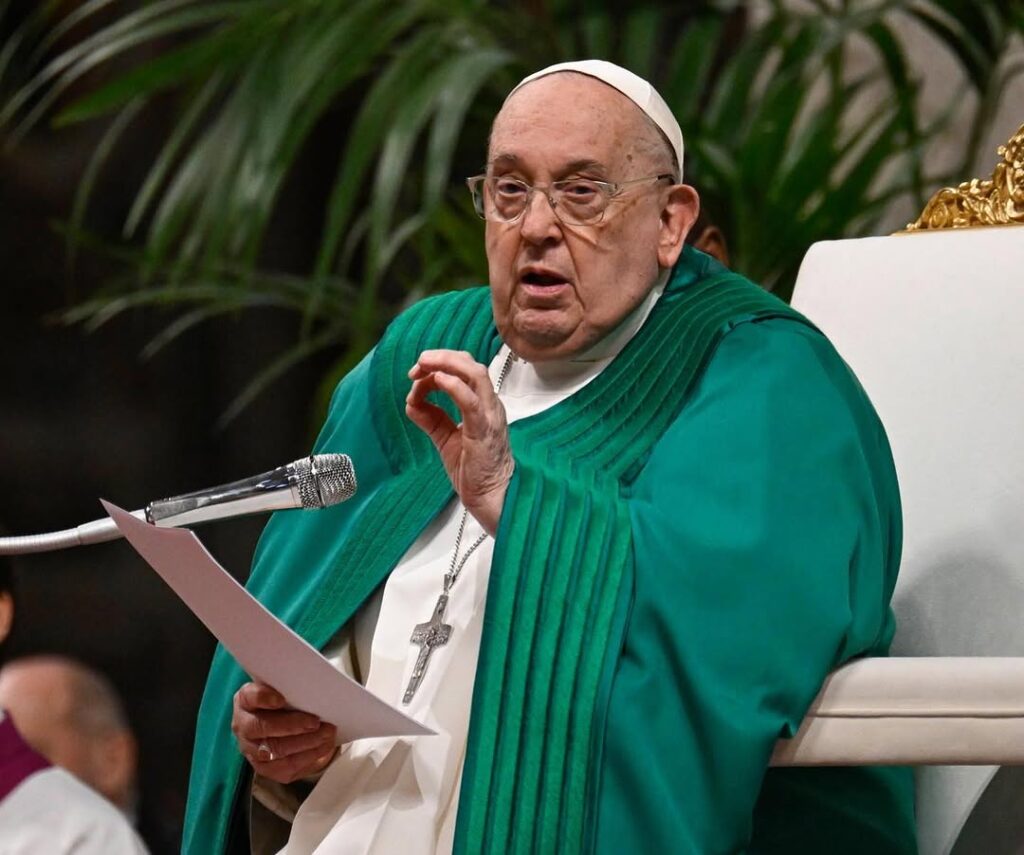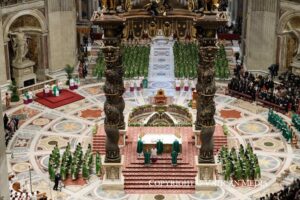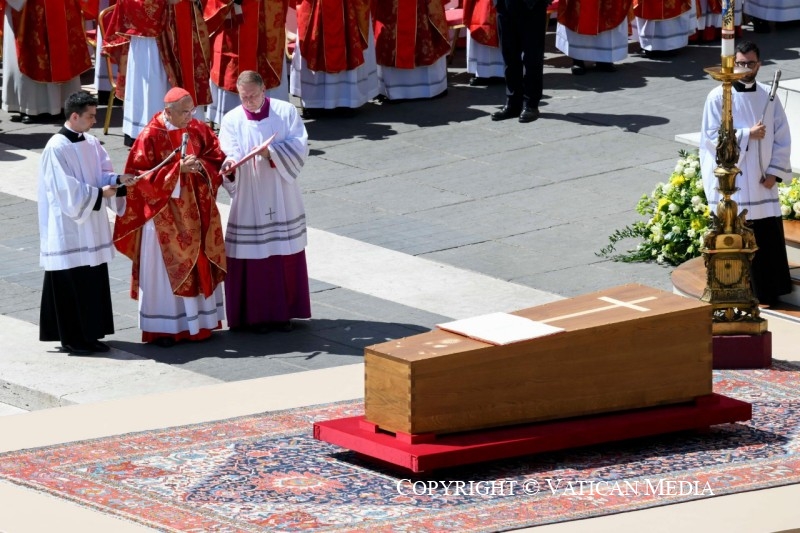The Pope: The Gospel is a living and certain word, which never disappoints
Homily, Sunday of the Word of God

On January 26, the Holy Father presided in St. Peter’s Basilica at the Holy Mass on the Sunday of the Word of God, in which he instituted 40 new lectors from different parts of the world and with which the Jubilee of the World of Communication was concluded. The Pontiff: “The Word of God is alive; it walks with us throughout the centuries and acts in history by the power of the Holy Spirit.”
Below, we publish the homily that Pope Francis pronounced after the proclamation of the Gospel:
***
Homily of the Pope
The Gospel that we have heard announces to us the fulfillment of a prophecy filled with the Holy Spirit. And the one who fulfills it is He who comes “with the power of the Spirit” (Lk 4:14): it is Jesus, the Savior.
The Word of God is alive; He walks with us through the centuries and acts in history by the power of the Holy Spirit. The Lord, in fact, always remains faithful to his promise, which he keeps out of love for mankind. This is precisely what Jesus said in the synagogue at Nazareth: “Today this passage of Scripture has been fulfilled in your hearing” (Lk 4:21).
 Brothers and sisters, what a happy coincidence! On the Sunday of the Word of God, still at the beginning of the Jubilee, this page of Luke’s Gospel is proclaimed, in which Jesus reveals himself as the Messiah “consecrated by the anointing” (v. 18) and sent to “proclaim a year of favor from the Lord” (v. 19). Jesus is the living Word, in whom all the Scriptures find their full fulfillment. And we, in the today of the holy Liturgy, are his contemporaries. We too, filled with wonder, should open our hearts and minds to listen to him, for “when the Holy Scripture is read in the Church, it is he who speaks” (Second Vatican Council, Sacrosanctum Concilium, 7). I have said one word: wonder. When the Gospel, the words of God, are proclaimed to us, it is not just a matter of listening, of understanding; no. These words must reach the heart and cause what I have mentioned: “wonder.” The Word of God always surprises us, always renews us, enters the heart and always renews us.
Brothers and sisters, what a happy coincidence! On the Sunday of the Word of God, still at the beginning of the Jubilee, this page of Luke’s Gospel is proclaimed, in which Jesus reveals himself as the Messiah “consecrated by the anointing” (v. 18) and sent to “proclaim a year of favor from the Lord” (v. 19). Jesus is the living Word, in whom all the Scriptures find their full fulfillment. And we, in the today of the holy Liturgy, are his contemporaries. We too, filled with wonder, should open our hearts and minds to listen to him, for “when the Holy Scripture is read in the Church, it is he who speaks” (Second Vatican Council, Sacrosanctum Concilium, 7). I have said one word: wonder. When the Gospel, the words of God, are proclaimed to us, it is not just a matter of listening, of understanding; no. These words must reach the heart and cause what I have mentioned: “wonder.” The Word of God always surprises us, always renews us, enters the heart and always renews us.
And with this attitude of joyful faith we are invited to welcome the ancient prophecy as coming from the Heart of Christ, dwelling on the five actions that characterize the mission of the Messiah: a unique and universal mission; unique, because He, only He, can carry it out; universal, because He wants to include everyone.
 First, He is sent “to bring good news to the poor” (v. 18). This is the “gospel”, the good news that Jesus proclaims: the Kingdom of God is at hand! And when God reigns, man is saved. The Lord comes to visit his people, taking care of the humble and the poor. This Gospel is a word of compassion, which calls us to charity, to forgive the debts of our neighbours and to a generous social commitment. Let us not forget that the Lord is close, merciful and compassionate. Closeness, mercy and compassion are God’s style. He is like that: merciful, close, compassionate.
First, He is sent “to bring good news to the poor” (v. 18). This is the “gospel”, the good news that Jesus proclaims: the Kingdom of God is at hand! And when God reigns, man is saved. The Lord comes to visit his people, taking care of the humble and the poor. This Gospel is a word of compassion, which calls us to charity, to forgive the debts of our neighbours and to a generous social commitment. Let us not forget that the Lord is close, merciful and compassionate. Closeness, mercy and compassion are God’s style. He is like that: merciful, close, compassionate.
Christ’s second action is to “announce release to the captives” (v. 18). Brothers and sisters, evil’s days are numbered, because the future belongs to God. With the power of the Spirit, Jesus redeems us from all guilt and frees our hearts, frees them from every internal chain, bringing the Father’s forgiveness to the world. This Gospel is a word of mercy, which calls us to be passionate witnesses of peace, solidarity and reconciliation.
The third action, with which Jesus fulfills the prophecy, is to give “sight to the blind” (v. 18). The Messiah opens the eyes of our hearts, often dazzled by the fascination of power and vanity; diseases of the soul that prevent us from recognizing the presence of God and that make the weak and the suffering invisible. This Gospel is a word of light, which calls us to the truth, to the witness of faith and to the coherence of life.
 The fourth action is to “give freedom to the oppressed” (v. 18). No slavery resists the action of the Messiah, who makes us brothers in his name. The prisons of persecution and death are thrown open by the compassionate power of God; because this Gospel is a word of freedom, which calls us to conversion of heart, honesty of thought and perseverance in trial.
The fourth action is to “give freedom to the oppressed” (v. 18). No slavery resists the action of the Messiah, who makes us brothers in his name. The prisons of persecution and death are thrown open by the compassionate power of God; because this Gospel is a word of freedom, which calls us to conversion of heart, honesty of thought and perseverance in trial.
Finally, the fifth action: Jesus is sent to “proclaim a year of favor from the Lord” (v. 19). It is a new time, which does not wear out life, but regenerates it. It is a Jubilee, like the one we have begun, preparing us with hope for the definitive encounter with the Redeemer. The Gospel is a word of joy, which calls us to welcome, to communion and to walk, as pilgrims, towards the Kingdom of God.
Through these five actions, Jesus has already fulfilled the prophecy of Isaiah. By bringing about our liberation, he announces to us that God is drawing near to our poverty, redeeming us from evil, enlightening our eyes, breaking the yoke of oppression and making us enter into the joy of a time and a history in which He is present, to walk with us and lead us to eternal life. The salvation that He gives us is not yet fully realized, we know; and yet wars, injustices, pain and death will not have the last word. The Gospel, in fact, is a living and sure word, which never disappoints. The Gospel never disappoints.
 Brothers and sisters, on the Sunday dedicated in a special way to the Word of God, we thank the Father for having given us his Word, made man for the salvation of the world. This is the event of which all the Scriptures speak, whose true authors are men and the Holy Spirit (cf. Vatican Council II, Dogmatic Constitution Dei Verbum, 11). The whole Bible recalls Christ and his work, and the Spirit makes it present in our life and in history. When we read the Scriptures, when we pray with them and study them, we do not only receive information about God, but we welcome the Spirit who reminds us of all that Jesus said and did (cf. Jn 14:26). In this way, our hearts, inflamed by faith, await in hope the coming of the Kingdom of God. Brothers and sisters, we need to be more accustomed to reading the Scriptures. I like to recommend that each one of us have a small Gospel, a small pocket New Testament, and carry it in our purse, always with us, to take it out during the day and read it. One passage, two passages… And thus, during the day, we have contact with the Lord. One small Gospel is enough.
Brothers and sisters, on the Sunday dedicated in a special way to the Word of God, we thank the Father for having given us his Word, made man for the salvation of the world. This is the event of which all the Scriptures speak, whose true authors are men and the Holy Spirit (cf. Vatican Council II, Dogmatic Constitution Dei Verbum, 11). The whole Bible recalls Christ and his work, and the Spirit makes it present in our life and in history. When we read the Scriptures, when we pray with them and study them, we do not only receive information about God, but we welcome the Spirit who reminds us of all that Jesus said and did (cf. Jn 14:26). In this way, our hearts, inflamed by faith, await in hope the coming of the Kingdom of God. Brothers and sisters, we need to be more accustomed to reading the Scriptures. I like to recommend that each one of us have a small Gospel, a small pocket New Testament, and carry it in our purse, always with us, to take it out during the day and read it. One passage, two passages… And thus, during the day, we have contact with the Lord. One small Gospel is enough.
Let us respond with enthusiasm to Christ’s joyful announcement. The Lord has not spoken to us as mute listeners, but as witnesses, calling us to evangelize at all times and in all places. Today, forty brothers and sisters from various parts of the world have come here to receive the ministry of lector. Thank you. We thank you and pray for them. We pray for all of you. Let us all commit ourselves to bringing good news to the poor, to announcing liberation to captives, to giving sight to the blind and to proclaiming a year of grace from the Lord. Then, sisters and brothers, we will transform the world according to the will of God, who created and redeemed it out of love. Thank you very much.
Related

Mercy and the joy of the Gospel are two key concepts of Pope Francis
Exaudi Staff
26 April, 2025
9 min

Thousands of faithful bid farewell to Pope Francis in St. Peter’s Square
Exaudi Staff
26 April, 2025
2 min

Saying Goodbye to Francis
Exaudi Staff
26 April, 2025
2 min

Pope Francis Gifts a Statue of Our Lady of Luján to Gemelli and the Catholic University of the Sacred Heart
Exaudi Staff
25 April, 2025
2 min
 (EN)
(EN)
 (ES)
(ES)
 (IT)
(IT)

